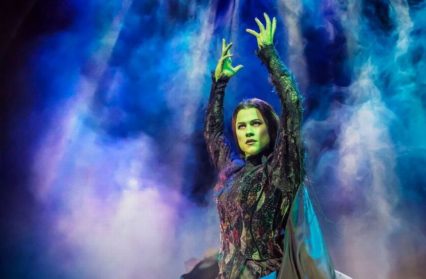Gary Raymond reviews the touring production of Gregory Maguire’s Wicked, an expansion of the fantasy world of The Wizard of Oz.
Like most people, I have been aware since childhood that you could take the girl out of Kansas but you can’t take the hoky do-good folksy wholesome Kansas out of the girl. The message of The Wizard of Oz is that determination mixed with a drop of naivety and the moral support of good friends can win the day. That kind of thinking was very popular in 1939 when the original movie version of L. Frank Baum’s children’s book was released to a world stepping out of the Great Depression and into a bright modern future (and another World War, but they wouldn’t have known that then). Great works of art don’t need a zeitgeist, of course, and there are many reasons why Victor Fleming’s movie is regarded as a gemstone in the crown of Hollywood’s Golden Era.
But we do now live in different times, and there may be something timeless about a little girl forming a band of crusaders from a selection of innocent misfits she meets on the road to free an oppressed people from the influence of an evil witch, but there is something far more satisfying in this day and age about the iconoclasm of Gregory Maguire’s Wicked. His 1994 novel is perhaps one of the finest examples of that strange and cheeky offspring of great literature, the one that likes to expound, twist and sometimes immolate an original classic. The lowly form of this is known is fanfiction (Fifty Shades of Grey, believe it or not, started out as fanfic for sparkly vampire melodrama Twilight), but higher up the mountain you find books like Jean Rhys’ Wide Sargasso Sea, Julian Barnes’ Flaubert’s Parrot, and… erm… Seth Graham-Smith’s Pride and Prejudice and Zombies. The most successful of these efforts find in the source material an untapped political well, one that charms powerful messages from subtexts (and deeper) and, most importantly, sends a disruptive ripple through our understanding of the original.
The achievement of Maguire’s Wicked is that it presents the reader with the hitherto ignored political landscape of Oz, which in turn makes the fantasy world more real than Baum ever did, introducing a new clear focus on the inevitabilities of real-world bureaucratic systems and the machiavellian patterns they encourage. What the runaway Broadway megahit adaptation has done has been nothing short of a magic trick, combining strong (if broad) progressive political messages with endearing songs and big laughs. If the original movie told us we can all overcome adversity if we are pure of heart, then Wicked has a very different message indeed. It dilutes Maguire’s political plotlines somewhat, but it doesn’t do this at the expense of its message. The stage musical of Wicked has taken a conscious decision at the concept stage that to hit big is to hit broad. And nobody can miss the politics of Wicked – they are sometimes delivered with such a thud that the actor delivering the line has to wait a few seconds for the noise to stop reverberating around the auditorium. But they are also not without edge. Mostly it is not enough, not artful, to simply say “racism is bad”, but what does it matter when the point is emphasised with a number that rattles the fillings in your teeth one minute and the shakes the salt out of your tear ducts the next? Okay, so Wicked isn’t sung by Nina Simone or penned by Claudia Rankine, but every night there are children (not to mention adults) leaving this show better people because they have seen it.
For this touring production, it is quite unthinkable that there has been a better Elphaba than Amy Ross (yes, even Idina Menzel); perhaps she has too few expressions in her armoury when it comes to exploring her angst, but on the big solo numbers “I’m Not That Girl” and “No Good Deed” she raises the roof, and on “Defying Gravity” she performs with all of the abandon of a million little girls singing into their dressing up mirror. Her range is awesome. Charli Bapti steps in for Helen Woolf as Glinda and does a sterling job – the epitome of an understudy taking an opportunity when it’s given. Steven Pinder is an affable rogue as the Wizard and Aaron Sidwell gives depth to playboy Fiyero.
To understand why some people become obsessed with certain musicals, you have to see one, to sit in the theatre and go no that journey. There can be few that have such endearing (and complex) musical numbers, such well-drawn characters, such satisfying plot turns, and such punchy progressive messages as Maguire’s Wicked. It is obvious why it is such a global success. And it is a good thing that it is.
Wicked is on at the Wales Millennium Centre in Cardiff until November 24th
You might also like…
Gary Raymond finds in Les Misérables a musical packed with some of the greatest songs ever written, but a show lacking any interest in the depths of the source material.
Gary Raymond is a novelist, broadcaster, and editor of Wales Arts Review.



 Enjoyed this article? Support our writers directly by buying them a coffee and clicking this link.
Enjoyed this article? Support our writers directly by buying them a coffee and clicking this link.








